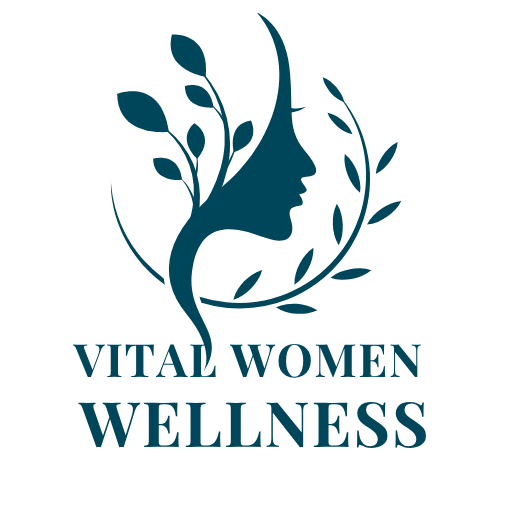As we get older, our bodies undergo many changes that affect our health and appearance. While a balanced diet and regular exercise are essential for aging gracefully, certain supplements can provide extra support in our quest for longevity and vitality.
Let’s explore the top 5 anti-aging supplements that have shown promising results in scientific studies and real-world applications.
1. Collagen: The Foundation of Youthful Skin and Healthy Joints
Collagen is the most abundant protein in our bodies, playing a crucial role in maintaining skin elasticity, joint health, and overall structural integrity. As we age, our natural collagen production decreases, leading to wrinkles, sagging skin, and joint discomfort.
This is where collagen supplements come into play.
Recent studies have demonstrated that oral collagen supplementation can significantly improve skin hydration, elasticity, and reduce the appearance of wrinkles. A 2019 systematic review published in the Journal of Drugs in Dermatology found that oral collagen supplements can increase skin elasticity, hydration, and dermal collagen density.
The benefits of collagen extend beyond skin-deep. Research suggests that collagen supplements may also help support joint health and reduce pain associated with osteoarthritis.
A 2018 study published in the British Journal of Nutrition found that collagen supplementation improved joint pain in athletes and reduced the risk of joint deterioration.
When choosing a collagen supplement, opt for hydrolyzed collagen peptides. These are broken down into smaller molecules, making them more easily absorbed by the body.
You can find collagen in powder form, which can be easily mixed into beverages or added to recipes.
For optimal absorption, take your collagen supplement with vitamin C. This essential vitamin aids in collagen synthesis and can enhance the effectiveness of your supplement.
You might consider adding some fresh citrus fruits or bell peppers to your diet when taking collagen.
Remember that while collagen supplements can be useful, they work best as part of a comprehensive skincare and health routine. Protecting your skin from sun damage, staying hydrated, and eating a balanced diet rich in vitamins and minerals will all contribute to the overall health of your skin and joints.
Recommended Product: Youtheory Advanced Collagen
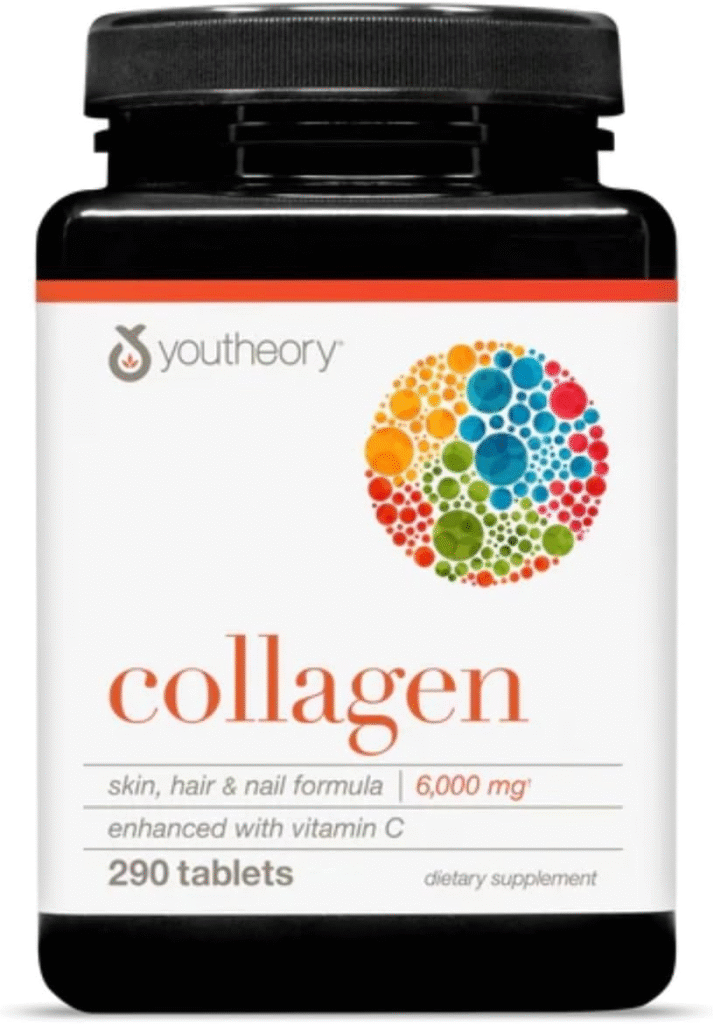
2. Nicotinamide Riboside (NR): The NAD+ Booster
Nicotinamide Riboside, a form of vitamin B3, has been making waves in the anti-aging world because of its ability to boost levels of NAD+ (nicotinamide adenine dinucleotide) in the body. NAD+ is a crucial coenzyme involved in many cellular processes, including energy production and DNA repair.
As we age, our NAD+ levels naturally decline, which may contribute to various age-related issues. Supplementing with NR has been shown to increase NAD+ levels, potentially leading to improved mitochondrial function, enhanced cellular energy production, and better overall cellular health.
A 2018 study published in Nature Communications found that NR supplementation in mice increased NAD+ levels and improved several markers of cardiovascular health. Human studies have also shown promise, with a 2017 study in the journal Nature reporting that NR supplementation safely elevated NAD+ levels in healthy middle-aged and older adults.
Research suggests that NR supplementation may have benefits for cognitive function, cardiovascular health, and metabolic health. Some studies have even indicated potential improvements in muscle function and endurance.
When considering an NR supplement, look for reputable brands that use Niagen, a patented form of NR that has been extensively studied. Start with the recommended dosage and talk to a healthcare professional if you have any underlying health conditions.
It’s worth noting that while NR supplementation shows promise, it’s not a magic bullet for aging. The effects can vary from person to person, and more long-term studies are needed to fully understand its impact on human health and longevity.
As with any supplement, it’s best to mix NR with a healthy lifestyle for optimal results.
Recommended Product: Nutricost Nicotinamide Riboside + Resveratrol
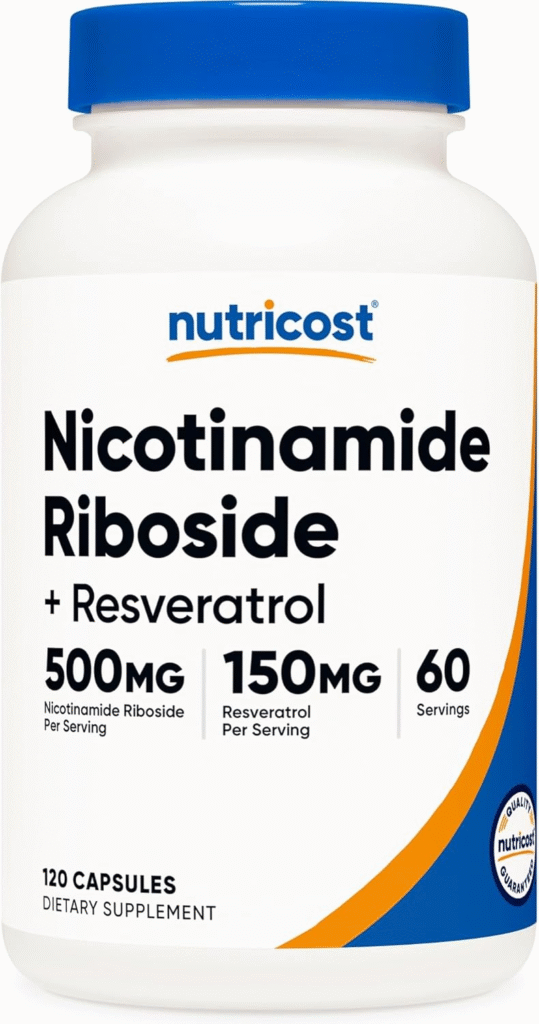
3. Resveratrol: The Longevity Molecule
Resveratrol, a polyphenol compound found in red wine, grapes, and berries, has gained attention for its potential anti-aging properties. Its claim to fame comes from its ability to activate sirtuins, a group of proteins involved in cellular health and longevity.
Studies have shown that resveratrol may offer a wide range of benefits:
- Antioxidant properties: Resveratrol is a powerful antioxidant that helps combat oxidative stress, a key factor in aging and age-related diseases.
By neutralizing free radicals, resveratrol may help protect cells from damage and slow down the aging process at a cellular level.
- Cardiovascular benefits: Research suggests that resveratrol may improve blood pressure and cholesterol levels.
A 2019 meta-analysis published in Clinical Nutrition found that resveratrol supplementation significantly reduced systolic blood pressure.
This could potentially lower the risk of heart disease and stroke, two major concerns as we age.
- Neuroprotective effects: Some studies show that resveratrol may support cognitive function and potentially reduce the risk of neurodegenerative diseases.
It’s thought to work by reducing inflammation in the brain and promoting the growth of new brain cells, which could help maintain mental sharpness as we age.
- Anti-inflammatory properties: Chronic inflammation is a hallmark of aging.
Resveratrol has shown promise in reducing inflammation markers in various studies.
By combating inflammation, resveratrol may help prevent or mitigate a range of age-related conditions, from arthritis to heart disease.
While resveratrol is found in red wine, the amounts are relatively small, and excessive alcohol consumption is not recommended. Instead, consider a high-quality resveratrol supplement to potentially reap its anti-aging benefits. Look for trans-resveratrol in supplements, as this form is more stable and bioavailable than its cis-resveratrol counterpart.
When taking resveratrol supplements, it’s important to be patient. The effects of resveratrol are often subtle and may take time to become noticeable.
Consistency is key, so try to take your supplement at the same time each day.
Some people prefer to take resveratrol with a meal containing healthy fats, as this may enhance absorption.
While resveratrol shows promise as an anti-aging supplement, it’s not a substitute for a healthy lifestyle. For the best results, mix resveratrol supplementation with a balanced diet rich in fruits and vegetables, regular exercise, and good sleep habits.
Recommended Product: Toniiq Ultra High Purity Resveratrol Capsules
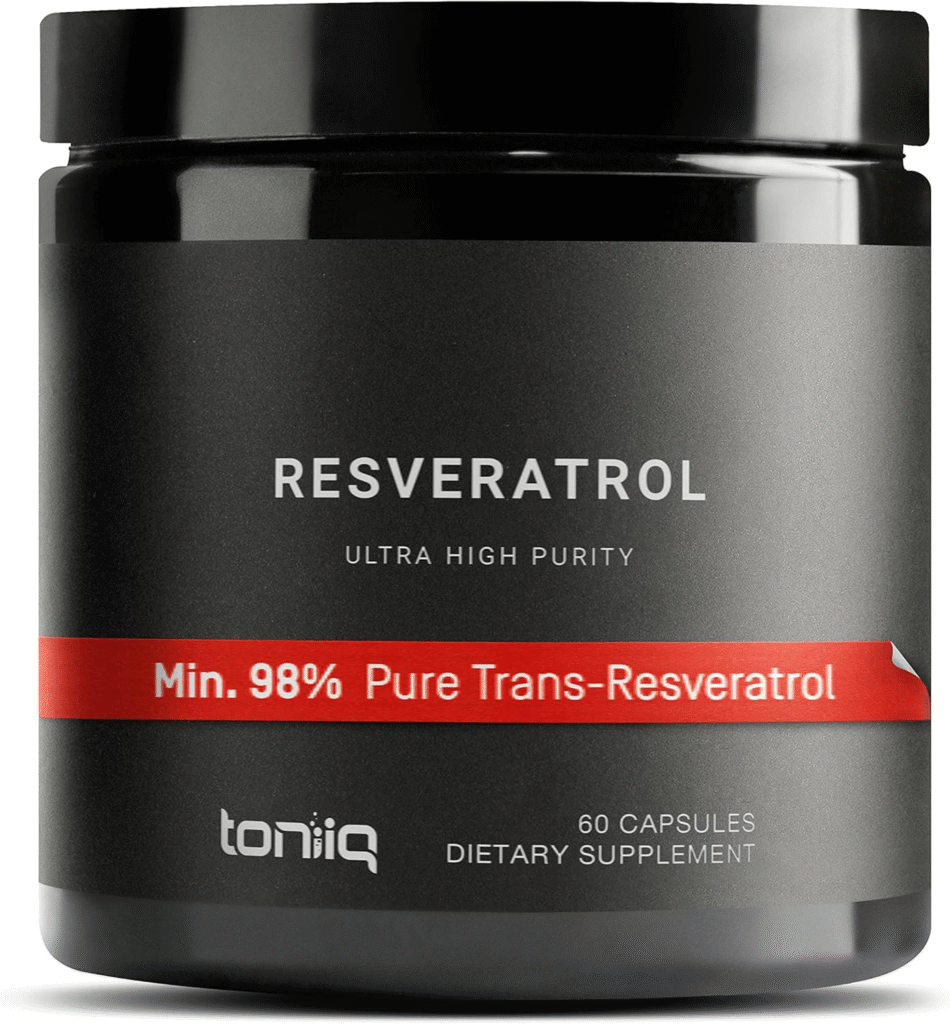
4. Coenzyme Q10 (CoQ10): The Cellular Energizer
Coenzyme Q10, or CoQ10, is a naturally occurring antioxidant in our bodies that plays a crucial role in energy production within our cells. Like many other compounds, CoQ10 levels tend to decrease as we age, which may contribute to various age-related issues.
Supplementing with CoQ10 has been associated with several potential anti-aging benefits:
- Improved skin appearance: A 2018 study published in Biofactors found that both topical and oral CoQ10 supplementation reduced wrinkles and improved skin smoothness.
CoQ10 may help protect the skin from oxidative damage caused by UV radiation and other environmental stressors, potentially slowing down the visible signs of aging.
- Enhanced energy production: CoQ10 is essential for mitochondrial function, which can lead to reduced fatigue and increased energy levels.
This could be particularly useful for older adults who often experience a decline in energy as they age.
By supporting cellular energy production, CoQ10 may help maintain vitality and improve overall quality of life.
- Cardiovascular support: Research suggests that CoQ10 may improve heart function and blood pressure.
A 2014 meta-analysis published in the American Journal of Clinical Nutrition found that CoQ10 supplementation significantly reduced systolic blood pressure.
This could be particularly important for older adults, as cardiovascular health becomes increasingly crucial with age.
- Neuroprotective properties: Some studies show that CoQ10 may help maintain cognitive function and potentially reduce the risk of neurodegenerative diseases.
By supporting mitochondrial function in brain cells, CoQ10 might help preserve mental acuity and memory as we age.
CoQ10 comes in two forms: ubiquinone and ubiquinol. Ubiquinol is the active form of CoQ10 and may be more easily absorbed, especially in older adults.
However, both forms can be effective when taken in suitable doses.
When choosing a CoQ10 supplement, consider factors such as bioavailability and dosage. Some formulations include black pepper extract or are emulsified to enhance absorption.
It’s also worth noting that CoQ10 is fat-soluble, so taking it with a meal containing healthy fats can improve absorption.
While CoQ10 supplementation is generally considered safe, it’s always wise to talk to a healthcare professional before starting any new supplement regimen, especially if you’re taking medications. Some drugs, particularly statins used to lower cholesterol, can reduce CoQ10 levels in the body, making supplementation even more important.
For best results, consistency is key with CoQ10 supplementation. It may take several weeks or even months to notice significant benefits, so patience is important.
Combining CoQ10 with other antioxidants like vitamin E or alpha-lipoic acid may enhance its effects, but always check with a healthcare provider before combining supplements.
Recommended Product: Sports Research CoQ10
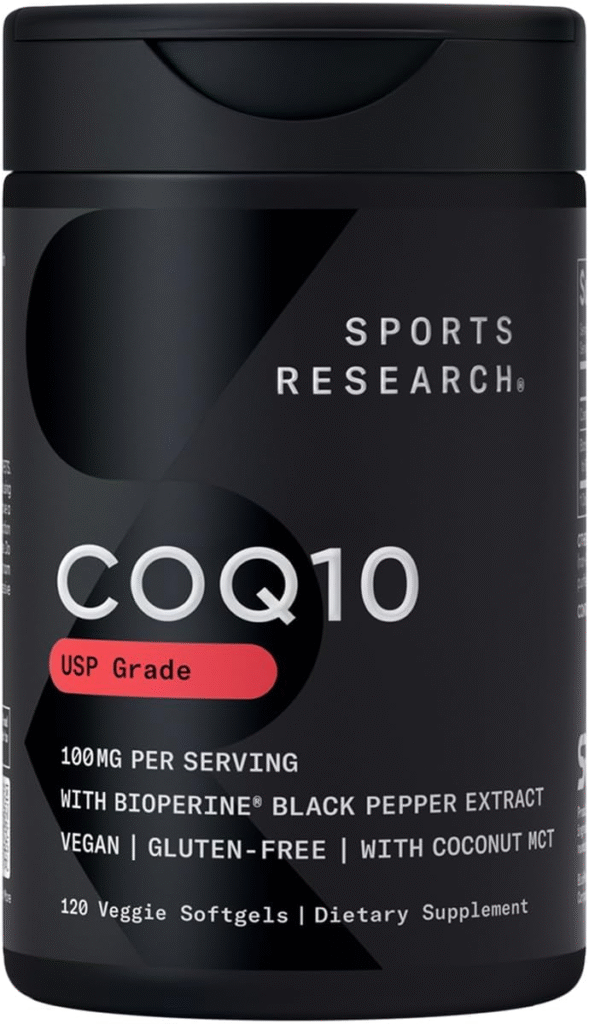
5. Curcumin: The Golden Anti-Inflammatory
Curcumin, the active compound found in turmeric, has been used for centuries in traditional medicine. In recent years, scientific research has shed light on curcumin’s potential anti-aging properties.
Curcumin is known for its powerful anti-inflammatory and antioxidant effects, which may help combat various age-related issues. Some potential benefits of curcumin supplementation include:
- Reduced inflammation: Chronic inflammation is a key factor in aging and age-related diseases.
Curcumin has been shown to reduce inflammation markers in many studies.
By combating chronic inflammation, curcumin may help prevent or mitigate a range of age-related conditions, from arthritis to heart disease and even some forms of cancer.
- Improved brain function: Research suggests that curcumin may have neuroprotective effects and potentially improve cognitive function.
A 2018 study published in the American Journal of Geriatric Psychiatry found that curcumin supplementation improved memory and attention in older adults without dementia.
Curcumin may help by reducing inflammation in the brain, clearing away harmful proteins associated with Alzheimer’s disease, and potentially even stimulating the growth of new brain cells.
- Joint health support: Curcumin’s anti-inflammatory properties may help reduce pain associated with arthritis.
A 2016 systematic review published in the Journal of Medicinal Food found that curcumin supplementation reduced arthritis symptoms.
This could be particularly useful for older adults looking to maintain mobility and quality of life as they age.
- Cardiovascular benefits: Some studies show that curcumin may improve endothelial function and reduce the risk of heart disease.
By supporting the health of blood vessels and reducing inflammation, curcumin could play a role in maintaining cardiovascular health as we age.
One challenge with curcumin is its low bioavailability when consumed on its own. To enhance absorption, look for curcumin supplements that include piperine (black pepper extract) or are formulated with advanced delivery systems like liposomal technology.
These formulations can significantly increase the amount of curcumin that your body can actually use.
Consider taking your curcumin supplement with a meal that contains healthy fats to further improve absorption. Combining curcumin with other anti-inflammatory foods and spices, such as ginger or omega-3 fatty acids, may enhance its effects.
Remember that while curcumin shows promise as an anti-aging supplement, more research is needed to fully understand its long-term effects. As with any supplement, it’s best to start with a lower dose and gradually increase as tolerated. Always talk to a healthcare professional before starting any new supplement regimen, especially if you’re taking medications or have existing health conditions.
For those who prefer a more natural approach, incorporating turmeric into your diet can be a great way to get some of the benefits of curcumin. Try adding turmeric to smoothies, soups, or curries. However, keep in mind that the amount of curcumin in turmeric is relatively small, so a supplement may be necessary to achieve therapeutic doses.
Recommended Product: Life Extension Curcumin
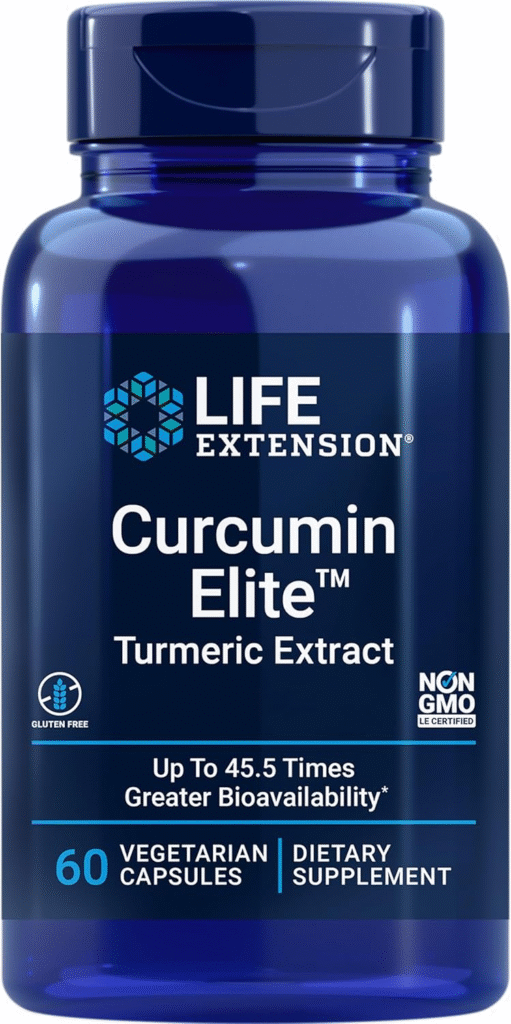
Conclusion
These five anti-aging supplements, collagen, nicotinamide riboside, resveratrol, CoQ10, and curcumin, offer promising potential in supporting healthy aging. However, they are not magic pills.
A holistic approach to anti-aging should include a balanced diet, regular exercise, stress management, and adequate sleep.
Consistency is key when it comes to supplements, so give them time to work and watch your progress over several months. By incorporating these evidence-based anti-aging supplements into a healthy lifestyle, you may be able to support your body’s natural processes and potentially slow down some aspects of the aging process.
Everyone’s body is different, and what works well for one person may not have the same effect on another. It’s always a good idea to keep a journal of your supplement regimen and any changes you notice in your health and well-being.
This can help you and your healthcare provider decide which supplements are most useful for you.
Lastly, while these supplements can be powerful tools in your anti-aging arsenal, they should never replace medical advice or treatment. Always talk to a healthcare professional before starting any new supplement regimen, especially if you have existing health conditions or are taking medications.
Frequently Asked Questions
What is the best anti-aging supplement?
There’s no single “best” anti-aging supplement as individual needs vary. However, collagen, nicotinamide riboside, resveratrol, CoQ10, and curcumin have shown promising results in scientific studies for various aspects of aging.
How long does it take for anti-aging supplements to work?
The time frame can vary depending on the supplement and individual factors. Generally, it may take several weeks to months of consistent use to notice significant effects.
Patience and consistency are key.
Are anti-aging supplements safe?
Most anti-aging supplements are generally safe when taken as directed. However, it’s always best to talk to a healthcare professional before starting any new supplement regimen, especially if you have existing health conditions or are taking medications.
Can anti-aging supplements replace a healthy diet and lifestyle?
No, supplements should complement, not replace, a healthy diet and lifestyle. The most effective anti-aging strategy combines proper nutrition, regular exercise, stress management, and adequate sleep with targeted supplementation.
What’s the difference between collagen types 1, 2, and 3?
Type 1 collagen is most abundant in skin, bones, and tendons. Type 2 is primarily found in cartilage.
Type 3 is often found alongside Type 1 in skin, blood vessels, and internal organs.
For skin health, Types 1 and 3 are typically recommended.
How does nicotinamide riboside (NR) differ from other forms of vitamin B3?
NR is a unique form of vitamin B3 that’s particularly effective at boosting NAD+ levels in the body. Unlike niacin (another form of B3), NR doesn’t cause flushing and may be more efficiently converted to NAD+.
Is resveratrol from red wine enough for anti-aging benefits?
While red wine contains resveratrol, the amount is relatively small. To achieve potential anti-aging benefits, a concentrated supplement is typically necessary.
Plus, the risks associated with alcohol consumption outweigh any potential benefits from resveratrol in wine.
Can CoQ10 interact with medications?
CoQ10 can interact with some medications, particularly blood thinners and some cholesterol-lowering drugs. Always talk to a healthcare provider before taking CoQ10 if you’re on any medications.
How can I increase the absorption of curcumin?
Curcumin absorption can be enhanced by taking it with black pepper extract (piperine) or in a liposomal formulation. Consuming it with a meal containing healthy fats can also improve absorption.
Are there any age restrictions for taking these anti-aging supplements?
While these supplements are generally safe for adults, it’s always best to talk to a healthcare provider before starting any new supplement regimen, regardless of age. Some supplements may be more useful or necessary as we get older.
Key Takeaways:
- Collagen supports skin elasticity and joint health
- Nicotinamide Riboside boosts NAD+ levels for improved cellular function
- Resveratrol activates longevity-associated proteins called sirtuins
- CoQ10 enhances energy production and supports heart health
- Curcumin offers powerful anti-inflammatory and antioxidant effects
Disclaimer
The information contained in this post is for general information purposes only. The information is provided by Top 5 Anti-Aging Supplements to Consider and while we endeavor to keep the information up to date and correct, we make no representations or warranties of any kind, express or implied, about the completeness, accuracy, reliability, suitability or availability with respect to the website or the information, products, services, or related graphics contained on the post for any purpose.
